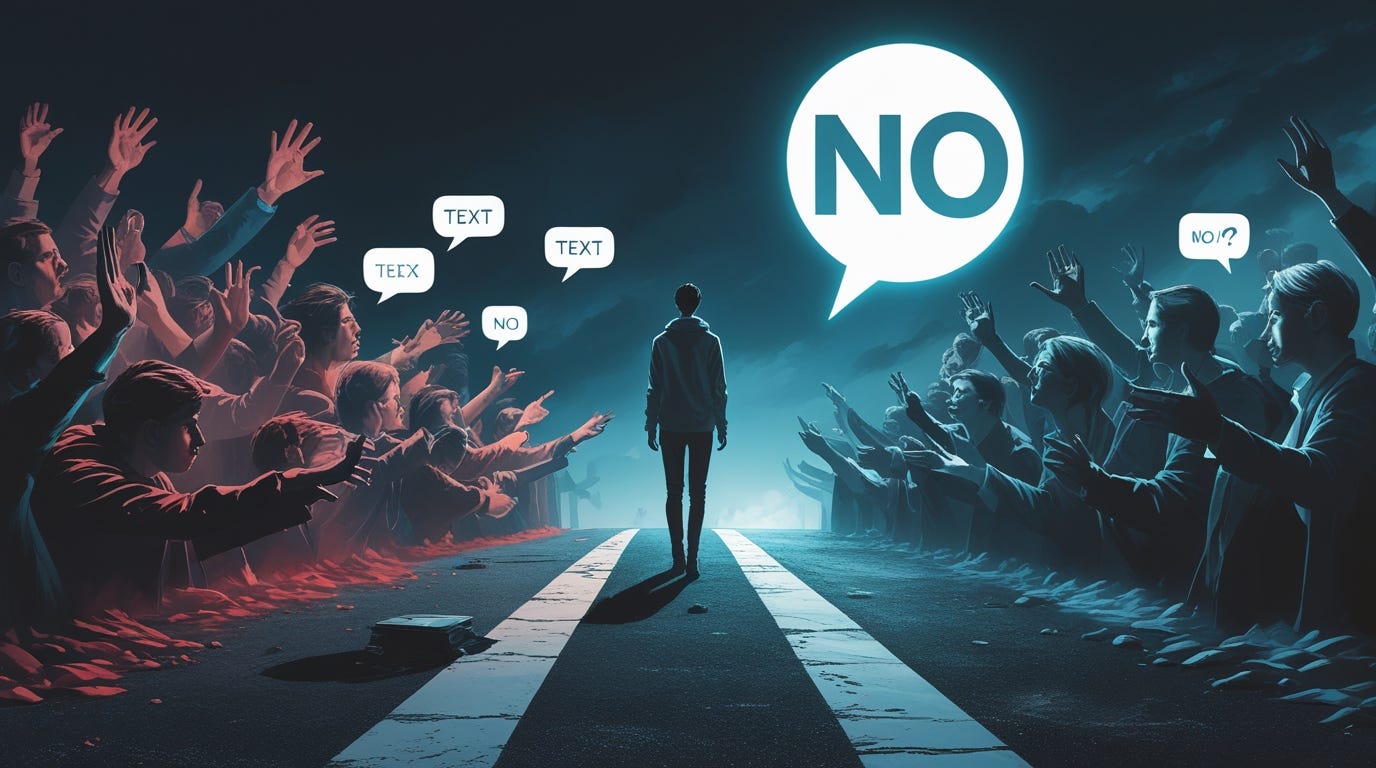How to Say No Without Feeling Like a Bad Person
Why protecting your energy doesn’t make you selfish, it makes you smart
Let’s be honest:
Most people say “yes” when they mean “no.”
They don’t want to upset anyone. They don’t want to seem rude.
They’d rather feel uncomfortable themselves than make someone else feel it for five seconds.
But every time you say yes when you mean no, you pay for it later, with your time, your focus, your peace.
Here’s the truth:
Saying no doesn’t make you cold.
It makes you clear.
Let’s break down how to say no, without guilt, drama, or turning into a jerk.
1. You’re Not Rude, You’re Just Honest
The reason most people struggle with “no” is simple:
They think being honest makes them mean.
But it’s not mean to protect your time.
It’s not rude to honor your energy.
It’s not selfish to have limits.
What’s actually rude?
Saying yes, then resenting the person.
Or ghosting. Or showing up half-hearted.
A kind, clear “no” is way more respectful than a fake “sure.”
Try this:
“Thanks for thinking of me, I’m not able to say yes to this right now.”
“I’m focused on fewer things at the moment, so I’ll have to pass.”
“That’s not something I can commit to, but I appreciate you asking.”
Short. Human. No apology needed.
2. You Don’t Owe Everyone Access to You
Saying no is not about rejection.
It’s about protecting access.
Your energy is limited.
If you give it to everyone, you have nothing left for the things that matter.
Start thinking of your attention like money.
Every “yes” is a withdrawal.
If you’re not checking the balance, you’ll go emotionally broke.
Ask yourself:
Is this aligned with what I truly value?
Would I still say yes if I didn’t feel guilty?
What am I saying no to if I say yes to this?
Say yes to what’s aligned.
Say no to what’s not, even if it’s “kinda” good.
3. The Guilt Is a Sign You’re Growing
Feeling guilty after saying no?
That’s not a bad sign, it’s a sign you’re unlearning something.
Most people were trained to be “nice” instead of honest.
Especially if you were raised to be the helper, the peacemaker, the “good kid.”
So of course it feels weird at first.
Of course guilt shows up.
But here’s the thing:
Guilt doesn’t mean you did something wrong.
It just means you’re doing something different.
Let it pass. It will.
You’re building a new default, one that actually respects your boundaries.
4. Boundaries Are Clarity, Not Control
Some people will take your no personally.
That’s okay. Let them.
Their reaction isn’t your responsibility — your clarity is.
A boundary isn’t about pushing people away.
It’s about getting closer to what matters:
Peace. Focus. Purpose. Rest. Real connection.
Saying no creates space for all of that.
And real people, the ones who respect you, will understand.
Or they’ll learn to.
5. Make “No” Boring and Normal
You don’t need to make a speech.
You don’t need to overexplain.
You don’t need to justify your choices like you’re on trial.
A powerful “no” is casual.
The more dramatic you make it, the more it feels like conflict.
The more normal you make it, the easier it gets.
Try this mindset shift:
Saying no isn’t dramatic. It’s maintenance.
Just like brushing your teeth or paying a bill.
You’re protecting your mind. Your calendar. Your energy. Your life.
That’s not selfish. That’s smart.
Final Thought: Saying No Is Saying Yes
Every “no” is a “yes” to something else:
Yes to space
Yes to calm
Yes to what matters
Yes to you
The people who move with clarity aren’t lucky.
They’re not cold.
They’re just willing to protect what matters.
And that starts with two letters:
No.
P.S. Forward this to someone who always says yes and ends up drained.
Or hit reply and tell me: what are you saying no to this week?




Love this! Love #5. I’ve just come through a year of learning around boundaries and the Truth they they are clarity is a profound wisdom.
I wish I could learn to normalise saying “No”. For me, it just didn’t feel like an option - I had to accept what few things came my way with grace and gratitude.